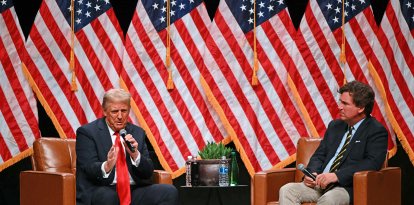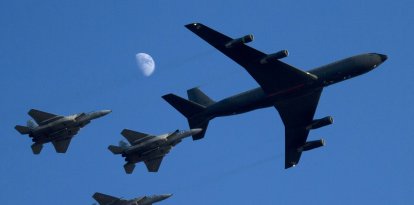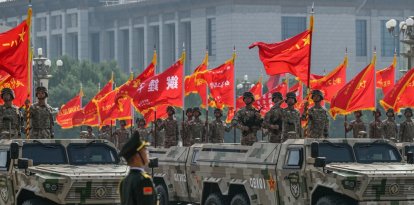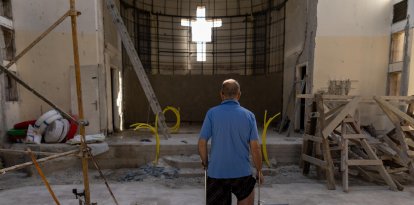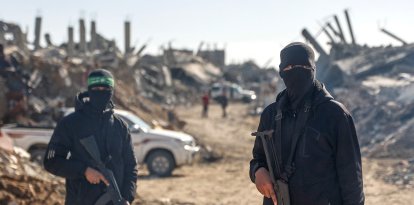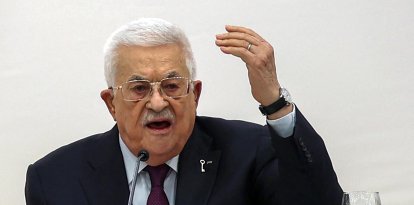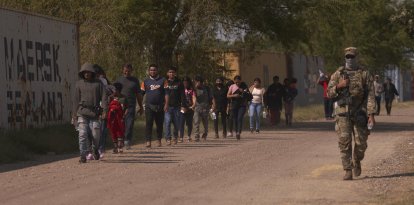Venezuelan gangs affiliated with Iran are invited into the United States
Hezbollah reportedly helped to "turn Venezuela into a hub for the convergence of transnational organized crime and international terrorism."

Immigrants at the border
- "Border Patrol zones across Texas, Arizona and California had no agent presence for weeks and months at a time. Those who did not want to be caught could simply walk in. We have no idea who and what entered our country over this time." — Aaron Heitke, retired chief patrol agent for the San Diego Sector of the U.S. Border Patrol in testimony before the U.S. House Committee on Homeland Security, September 18, 2024.
- "Simultaneously, in San Diego we had an exponential increase in [Special] Interest Aliens (SIAs). These are aliens with significant ties to terrorism.... I was told I could not release any information on this increase in SIA's or mention any of the arrests. The administration was trying to convince the public that there was no threat at the border." — Aaron Heitke in testimony before the U.S. House Committee on Homeland Security, September 18, 2024.

Society
The Border Patrol arrests a South African who entered the country illegally and was on the terrorist list
Emmanuel Alejandro Rondón
More than half a million Venezuelans have entered the U.S. illegally since President Joe Biden took office in January 2021, according to the Federation for American Immigration Reform. Until Biden became president, few Venezuelans arrived illegally. Only around 4,500 arrived in 2020. After Biden's inauguration, however, numbers exploded: 50,499 Venezuelans illegally entered in 2021, another 189,520 in 2022 and a whopping 334,914 in 2023.
This means that Venezuelans now rank second in illegal immigration into the US, after Mexicans, who still take the number one spot.
For more than two decades, Venezuela has been a close ally of Iran, and a regional home base for Hezbollah, Iran's proxy in the Middle East. Hezbollah, according to one 2020 Atlantic Council report, helped to "turn Venezuela into a hub for the convergence of transnational organized crime and international terrorism."
Iran's Quds Force is a subsection of the Islamic Revolutionary Guard Corps (IRGC). Quds Force runs Iran's terrorist operations abroad, and it established operations in Latin America with Venezuela's support during the Hugo Chávez regime (1999-2013), noted Jorge Serrano, a security expert and member of the team of advisors to Peru's Congressional Intelligence Commission. Quds Force has a local unit in Venezuela, Unit 840, which recruits and relies on local criminal groups to conduct assassinations and kidnappings (the practice of hiring local criminals to do Iran's bidding has also spread to Europe).
According to Alejandro Cassaglia, an expert in terrorism and organized crime and professor at the University of Buenos Aires in Argentina:
"It's crucial to recognize that these groups are dedicated to hybrid warfare, cyber-intelligence, and terrorist attacks... The presence of Iran and the Quds Force [in Latin America] is not just a potential risk, but a palpable reality. These criminals have total freedom of movement in the region, they have Venezuelan passports and are usually of Lebanese or Persian origin."
One of these groups is the Venezuelan gang Tren de Aragua, described as a "mega-gang" or a conglomerate of different criminal groups, by Transparencia Venezuela, an NGO notes the gang is the "largest and most powerful organization in Venezuela" with more than 4,000 criminals. It has been described as "MS-13 on steroids."
The state of Texas has designated Tren de Aragua as a foreign terrorist organization. According to Serrano, the gang "has Iran's support" and have forged "strategic alliances with Russia, China, and North Korea."
In July, a federal memo said that the Tren de Aragua gang had been given the "green light" by its leaders to "attack and open fire on cops in Denver," according to the New York Post.
The gang has "a history of flooding other countries with military-aged Venezuelan males to establish a base of operation to carry out violent crimes in those countries," Texas Governor Greg Abbott said in September.
The Biden administration, knowing this, allowed Tren de Aragua to come into the US, where they now have set up shop in at least 16 states, and have already been tied to hundreds of crimes, including the shooting of two New York Police Department officers in June.
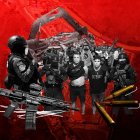
Society
From Trump's neighborhood to a remote northern town: Tren de Aragua spreads across the US
Santiago Ospital
How did the Biden administration do it?
According to the Center for Immigration Reform:"The major driver of Venezuelan migration to the U.S. has been policies that allow illegal aliens to enter, be released, and work in the United States. Many Venezuelan nationals are taking advantage of the Biden Administration's illegal categorical parole program, announced in late 2022. Under this program, Venezuelans and dual citizens of Venezuela can fly directly into the U.S. without a visa. Furthermore, the Biden Administration has designated and re-designated Venezuela Temporary Protected Status(TPS), which blocks the government from deporting Venezuelan nationals and offers them work permits. This has incentivized more Venezuelans to come to the U.S. because they anticipate similar treatment."
Former director of U.S. Immigration and Customs Enforcement Tom Homan, tapped by President-elect Donald J. Trump to be the U.S. "border czar" of the United States, has stated that Biden is the only president in U.S. history to "unsecure the border on purpose."
It is impossible to see the invasion at the border as anything other than planned by the Biden administration. When Venezuela began to empty its prisons of criminals two years ago, the U.S. Department of Homeland Security, aware that the criminals were heading to the U.S. border, gave the United States Border Patrol instructions to look for violent criminals from Venezuela entering the country.
If the Biden administration had wanted to stop the invasion, in the words of U.S. House Representative Troy Nehls: "For starters, he can use Section 212 (f) of the Immigration and Nationality Act, which states, 'Whenever the President finds that the entry of any aliens or of any class of aliens into the United States would be detrimental to the interests of the United States, he may by proclamation, and for such period as he shall deem necessary, suspend the entry of all aliens or any class of aliens as immigrants or nonimmigrants, or impose on the entry of aliens any restrictions he may deem to be appropriate.' Simply put, Biden could end the entry of illegal aliens, or specifically Venezuelans, today. Instead, he is callously and consciously refusing to do so."
Aaron Heitke, a retired chief patrol agent for the San Diego Sector of the U.S. Border Patrol, gave testimony on September 18 to the U.S. House Committee on Homeland Security, revealed that "Biden and Harris' policies so overwhelmed the Border Patrol that upwards of 80-90% of agents were completely pulled away from the border to process and release historic numbers of border crossers." Heitke testified:
"Sectors were ordered to take in and process all the illegal aliens encountered on the border. The Border Patrol saw groups of hundreds and thousands coming into the United States and turning themselves in. These numbers pulled 80-90%, sometimes 100% of the agents on duty away from the border. Border Patrol zones across Texas, Arizona and California had no agent presence for weeks and months at a time. Those who did not want to be caught could simply walk in. We have no idea who and what entered our country over this time. Throughout 2022 and 2023 I sent agents to Texas and Arizona to count gotaways. Those sectors could not even put enough agents in the field to see what they had missed."
As evidence of the national security risks caused by the Biden administration, it told Border Patrol agents to lie about the number of terrorists entering the country, according to Heitke.
"Simultaneously, in San Diego we had an exponential increase in [Special] Interest Aliens (SIAs). These are aliens with significant ties to terrorism. Prior to this administration, the San Diego sector averaged 10-15 SIAs per year. Once word was out that the border was far easier to cross, San Diego went to over 100 SIAs in 2022, way over 100 SIAs in 2023 and more than that this year. These are only the ones we caught. At the time, I was told I could not release any information on this increase in SIA's or mention any of the arrests. The administration was trying to convince the public that there was no threat at the border."















